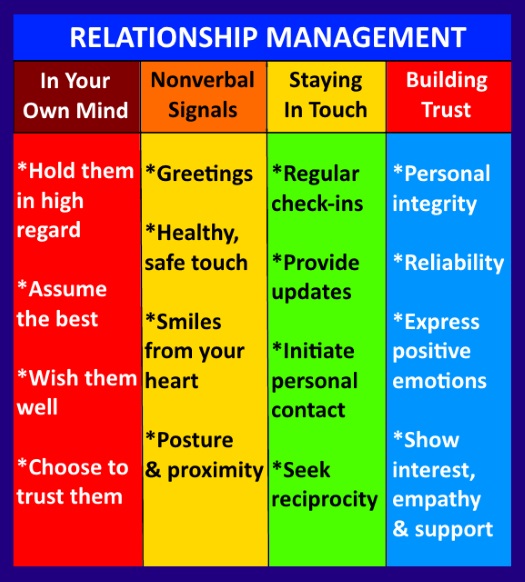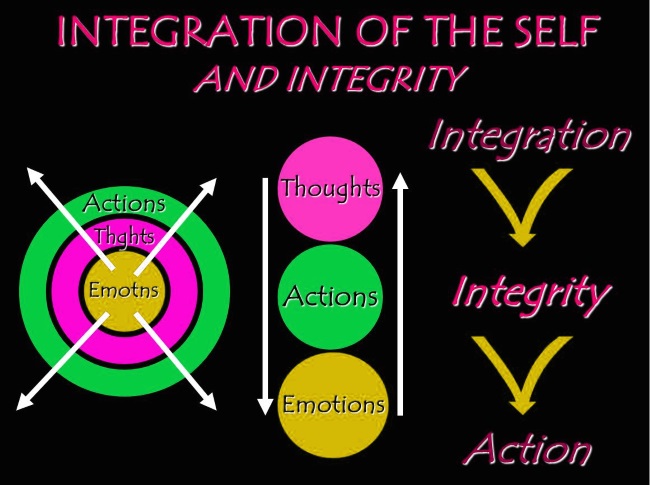How To Build Trust In A Relationship
And Raise Your Emotional Intelligence
Authored by William G. DeFoore, Ph.D.
When you build trust in a relationship, you are exercising the best possible relationship management, which is one of the four primary areas of emotional intelligence.
Your relationships are extremely important to your happiness, as you probably know. As a matter of fact, some people think that good relationships are the primary source of happiness...and that's almost true.
Your happiness actually emerges from inside you, and depends on a healthy relationship with yourself, as reflected in the first two components of emotional intelligence, self awareness and self management.
Here's a four part overview of relationship management:
Notice we're not talking about how to manage other people...that's just not possible. You can, however, manage your relationships, and building trust in a relationship is the best way to do that.
Trust in a relationship is a tricky business. To dive deeper into that important topic, read our page on the definition of trust.
You are responsible for your relationships, and you have more power to make a positive difference in them than you realize.
Now let's go further into each of these areas of relationship management and how to build trust.
How To Manage Relationships In Your Own Mind
That's where it all starts, in your mind. Your mind and your imagination is your creative laboratory, and you can have tremendous impact on all of your relationships by being aware, positive and proactive in how you think about the people in your life.
- Hold them in high regard. Your fault-finding, critical mind is active in your closest relationships, because they matter so much to you. That's why you need to make up your mind to hold the people you care about in the highest possible regard. This will lower your stress, and you will bring a more upbeat and positive attitude into your relationships, which makes everything better for everyone.
- Always assume the best of the people you care about, or those you work closely with. This is not only beneficial to your view of the other person, it helps you to move closer to the positive, loving person that you truly are at the core of your being.
- Choose to wish them well, no matter what is going on in the relationship. This keeps you in your most loving mood and attitude, which is essential to building trust in a relationship. This is a kind of positive prayer, if you choose to see it that way.
- Choose to trust them. Trust is a choice you make, it's not something you wait for the other person to earn. If they prove to be consistently untrustworthy, then you may have to set boundaries in the relationship so that you feel comfortable. Wherever possible, decide to trust them, and things will usually go well.
It's important to understand that the critical, doubting part of your mind is trying to protect you from disappointment, hurt and betrayal. If it's allowed to dominate your perception of the other person, however, it can literally destroy the relationship, or at least create much too much unhappiness.
How To Send Positive Nonverbal Signals
Communications studies have shown that nonverbal signals have a large impact on the actual message received. We know for sure that as human beings we are constantly reading nonverbal messages from other people and responding to them, even if only subconsciously.
We're going to cover some very basic forms of unspoken communication here, because of how important they are in building trust in a relationship.
- Everyone likes to be greeted, whether they are aware of this fact or not. Make it a point to look at people you see, and smile, nod, and/or call them by name, based on whether you know them well or not at all. While this might seem so basic as to be silly, it's actually one of the best things you can do for positive relationship management and building trust in a relationship.
- Use touch wherever you can,
appropriately and safely. Handshakes, hugs or hands on shoulders are
generally safe and innocuous enough, with casual acquaintances and
close loved ones. The need for touch is tremendous, and when you master the art of loving and appropriate touch, it will greatly enhance your success in managing relationships.
- Smile from your heart, for your own sake and for everyone you see. A genuine, authentic smile makes it more likely that people will want to help you in any way they can. Don't make the mistake of thinking this doesn't matter. It is extremely important in establishing trust in any relationship, however close or distant.
- Use posture and proximity wisely and you will greatly enhance your ability to put others at ease and maintain your own comfort level. Your posture speaks volumes, and it becomes more important with age, so get started correcting it now if need be. And when it comes to your proximity to others, trust your own intuitive sensitivity to know the best closeness or distance to use.
How To Maintain Connections By Staying In Touch
You already know how it feels when someone calls or contacts you just to see how you're doing. We all need and want that, but surprisingly few people put conscious thought into it.
Having close meaningful relationships is a very beneficial thing for your health and happiness, and it won't just happen all by itself. Here are some ways you can keep those connections strong and lively:
- Check in regularly with people you care about. When you don't hear from someone in a long time, it's easy to assume that the relationship is not that important to them. Use any and all means to connect, including phone calls, text, emails, letters, cards and even Facebook. Any connection is better than none. Make a list of the people you care about, and make a calendar to remind you to contact them.
- Provide updates when important things are going on in your life, like new arrivals, illness, travel or relocation. This is just another of many ways to let people know you're thinking of them, and that they matter to you.
- Whenever possible, initiate personal, face-to-face contact. Plan social events, and get out and have fun with the people that matter to you. This will greatly add to your happiness, and benefit you in many ways. There is no substitute for actually making time in your schedule to spend personal time with someone you care about.
- Seek reciprocity in your relationships. All nature seeks balance, and when one person is doing all of the initiating to maintain the connection, it starts to feel uncomfortable over time. If the relationship matters to you, reply when they reach out, and try to match invitations with invitations. If you're doing all of the initiating, you may decide after a while it's time to move on.
How To Establish Trust In A Relationship
This is really the bottom line in relationship management. Without a certain degree of trust, relationships are a source of stress and conflict. Remember, trust in a relationship is a decision you make, not a feeling you wait for.
Let's look at some steps you can begin taking right now.
- Personal integrity is key to relationship management and building trust in a relationship. It basically means that your thoughts, emotions and actions are integrated in such a way that makes you reliable and trustworthy. You walk the walk and talk the talk.
Here's a chart to show you the relationship between personal integration and integrity:
- Your reliability speaks to your character, and I encourage you to consider it to be one of your highest priorities. Can people count on you to do what you say you're going to do? Make sure the answer is yes.
- When you express positive emotions on a regular basis, it will greatly increase the sense of calm, confidence and ease that others feel in your presence. It will also add to your own feeling of calm and confidence. Make these authentic expressions, in order for people to trust you and what you're saying.
- When you show interest, empathy and support for the person you're connecting with, you greatly enhance the depth of that connection, and over time this will greatly add to the level of trust that they feel in your presence. Interest is particularly important. Showing genuine, heart-felt interest in what someone is talking about is one of the best ways to build trust in a relationship.
This is the fourth and final component of our emotional intelligence series of web pages. To review, those are:
- Self awareness
- Self management
- Social awareness
- Relationship management (this page)
Remember, growing your emotional intelligence is one of the greatest gifts you can give to yourself and your loved ones. Learn more about emotional intelligence here.
Have A Great Story Or Question About Anything Related To Emotional Intelligence?
Do you have a great story or question about emotional intelligence, anything related to it? Please share it!









New! Comments
We'd love to hear from you! Leave us a comment in the box below.